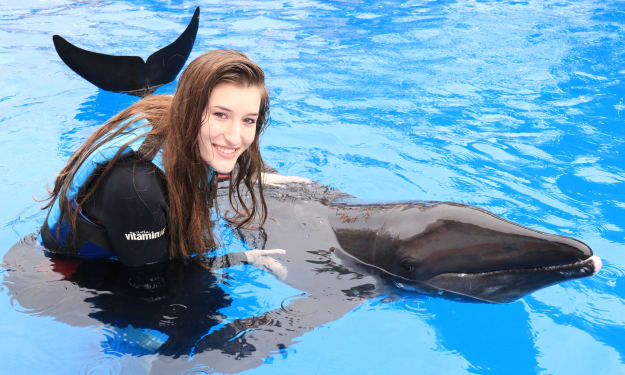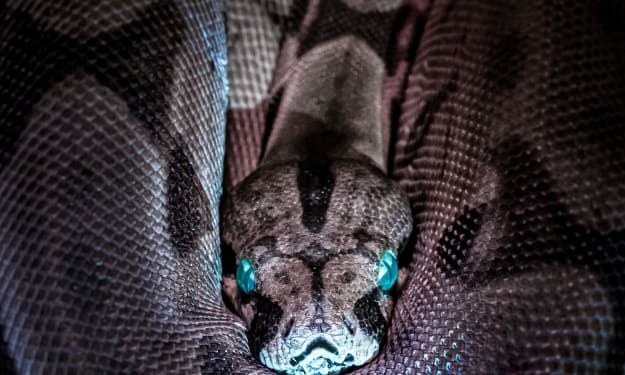Life-Long Tiger Trainer Speaks Out in the Light of the “Tiger King”
Felicia Friscia, a well-respected big cat handler who has been working with exotic cats since childhood opens up about her status as a licensed, private owner and proud mom to the cats that have been her family’s care for generations.

With the COVID-19 pandemic forcing both families and communities alike from around the world to stay home, and cancel all major plans until it is okay to resume normal life, it is no arguing that it has allowed people to do all sorts of activities at home with their loved ones like playing video games, watching movies, baking, cooking, doing some arts and crafts, and of course, binge whatever show is on either Netflix or Disney+ which brings me to my next subject, a little docuseries on Netflix called The Tiger King.
Regarded as a redneck version of the biased 2013 documentary Blackfish, The Tiger King is a seven-part limited series that puts all focus on a failed murder-for-hire plot that involved Joe Exotic, the former owner of an Oklahoma-based big cat breeding facility that offered people encounters with tiger cubs and other animals at the park. He was also a long critic of animal rights extremist, and owner of the Tampa Bay, Florida-based Big Cat Rescue Carole Baskin. Exotic had a very long obsession with Baskin and how she allegedly murdered her second, millionaire husband in 1997 by having him fed to one of her tigers. Baskin, on the other hand, had long criticized Exotic, who is now serving a 22-year sentence for several charges that involved violating the Endangered Species Act and his failed attempt to have Baskin killed.
However, the focus of this writing is not on the documentary itself, but on a big cat expert who has worked with exotic cats since childhood. Felicia Frisco is a long time friend of mine and has worked with big cats a trainer for a long time now and I have mentioned her a couple of times in some of my previous articles. She was once friends with Joe for several years until he started working with Jeff Lowe, a controversial businessman who went on to take over Joe’s zoo with plans to relocate the facility just south of the Texas border with his long-time partner Lauren later this year. So, anyway, after the series became a surprise hit, Felicia, who herself is a licensed private owner, decided to take the time to write a response to a concerned public about the keeping of tigers and other exotic mammals in human care, which includes zoos, circuses, research facilities, and as “legal” pets on a March 26th, 2020 Facebook post:
I have been hearing the word “private owner” or roadside zoo (they're referring to any non-AZA zoo as one) in a derogatory way as if we are some random people who bought a pet tiger. So, I’m gonna break it down for you.
I am a private owner I am licensed and inspected the same way as any zoo or sanctuary in this country, I carry the same insurance follow the same rules and regulations and safety protocols as any FC (Free contact) facility. All that private owners means is we are not government funded, we are privately owned. Some larger private owned facilities have a board just like a zoo. Some smaller ones like me are the sole caretaker minus one or two other people. The private owner does not just mean a “pet” many private owners have established breeding programs of endangered species that many zoos can’t get to breed. Many private owners exchange bloodlines with zoos.
My family has been doing this for several generations. I do not get grants from the government to care for my animals, nor I do not get donations for my animals’ care. You can’t just go buy a tiger on the Internet (go ahead, have fun paying for some dude in Nigeria vacation while he scams you) just because you see an exotic animal for sale online does not make it authentic.
Rescue for tigers in the USA has become a multimillion-dollar industry. (Start checking the tax reports for the GFAS accredited sanctuaries and see where the money is going) maybe 20 years ago, unwanted tigers in the USA were a reason for some sanctuaries to start (all though 90% bought and bred their animals before they filed for non-profit and found a new way to make money without getting backlash) back when you could buy a tiger in a pet store. But you can’t do that anymore and despite that, the laws and regulations have changed greatly. Just because In a couple states has no regulation doesn’t mean u can still get a tiger or a lion.
The amount of work it cost to raise, house, feed, treat and enrich an exotic animal, especially an apex predator is not something that comes easy or cheap it’s way more work and laws required then what you do for your “pet”. Stop condemning facilities and private owners as if they’re just some idiot with no experience owning an animal. Most of them are small zoos only open for select tours so their animals aren’t on exhibit all day. Some of them are owned by people who have had these animals for many years in their families. Many of them have been working and raising these species for over 30 years.
Just because someone is a “sanctuary” or “AZA” doesn’t give them a free pass at being great. I have witnessed some horrible conditions of elephants in AZA facilities. I have read some awful incidents in AZA facilities. I have seen many people killed at AZA facilities. The AZA (Association for Zoos and Aquariums) was created by zoos to govern and protect themselves; it costs a lot of money to join and it has some pretty out there rules you must follow which is why Zoos like the Pittsburg dropped AZA for the well being of their animals. I’m not condemning all AZA zoos, I am simply stating who and why it was created. Just because they are AZA doesn’t mean they care for their animals better then any other facility and the same goes for sanctuaries.
Elephants used to be able to be walked around the zoos after hours and get the exercise they need, that AZA a dedication takes that away from those elephants and keepers. Should every elephant be worked FC or be taken on walks? No, but it should be case by case for the animals involved. Not up to a board of people who don’t know these animals it should be up to the keepers and their zoo directors, not be told we won’t accredit you because we don’t believe you should do it.
If we had such an unwanted problem with tigers in the USA and all these pet tigers needing homes then why are we raising millions to bring tigers from other countries? What’s wrong with sanctuaries in their countries? If there are unwanted tigers in America why aren’t you giving them homes?
Because there’s not the only time these animals need homes is when another facility closes its doors or laws passed that then takes animals that have spent their entire lives living somewhere and sends them somewhere else.
My favorite line is “ If you have a tiger in your bed, you shouldn’t be talking about animal care”.
Yes, I have pictures of a tiger in my bed. Do you know why that tiger was in my bed? Because he was stepped on by his mother and had internal bleeding and the vets wanted me to euthanize him an said he wouldn’t make it through the night and if he did he wouldn’t make it past a week, and I brought him home he stayed in my bed so I could monitor and feed and check his temperature every two hours for two months. I based my entire life around that animal and his care I didn’t feed him and lock him in a kennel and then check him in two hours.
I have pictures of tigers in my bed and I also have pictures of tigers with their mothers, I have tigers in their 20’s. I have an amazing relationship with these animals that enables me to give them a greater life then a tiger stuck in a cage all day. These animals are raised by me and their parents, and working with them as cubs allow me to be able to live and work with them the way I do in the safest way possible to work free contact. They can go on walks at my facility they can do basic vet care without sedation they can have routine exams.
Am I saying facilities that don’t work FC are bad? No, but if I have the opportunity to enrich my animals in ways they enjoy why wouldn’t I?
Do I think every facility should work, via, free contact?
No!
Why? Because many large facilities and sanctuaries have a large staff that cares for animals any many come and go and these aren’t animals u just introduce anyone you want to. Smaller facilities are usually family-owned or have keepers that live at their zoo and have been their zoos and we’re involved in the entire raising of those animals lives.. it doesn’t make it wrong if a facility works FC with an animal and it doesn’t make it wrong if they don’t.
You don’t know these animals you don’t know what they like, or don’t like. Every animal is different. I’m also gonna point out I am inspected by more agencies then AZA zoos. The same goes for circuses who are inspected at every venue.
*Edit* “It’s dangerous”!!!
So is driving your car and you do it every day.
Although this was never mentioned on the show, Carole Baskin once attempted to have Felica placed in foster care by asking her followers to report her parents to Child Protection Services not long after her tiger training career took off as a teenager. The attempt was, luckily for Felica and her family, to be unsuccessful and it’s another example of how Carole will go after any facility that houses big cats and questions her work ethics such as keeping the cats under her care in smaller, substandard habitats, changing the biographies of how the cats came to her “sanctuary” by making-up stories about them having to have been “abused” and “neglected” when former owners have said otherwise, not paying any of her staff, and even hiring people with little-to-no prior experience in exotic animal husbandry and care.
It should also be noted that Carole has long ties to both PETA and the Humane Society of the United States. These groups have long been known for spending money on advertising, public disturbances, lobbying activities, and even giving monetary gifts to extremists who have committed crimes in the name of “animal rights”. These groups also have no expertise in animal husbandry, training, nor care in well-managed zoological facilities at all. Yet, they continue to use their power, money, and influence to gain control over the zoo and aquarium community as a whole by demanding to have certain animal species removed from accredited facilities and move them to unaccredited “sanctuaries” that don’t have the animals’ best interests in mind.
About the Creator
Jenna Deedy
Zoo and Aquarium Professional, Educator, Cosplayer, Writer and B.A. in Psychology whose got a lot to share when it comes to animals, zoos, aquariums, conservation, and more.
Instagram: @jennacostadeedy






Comments
There are no comments for this story
Be the first to respond and start the conversation.